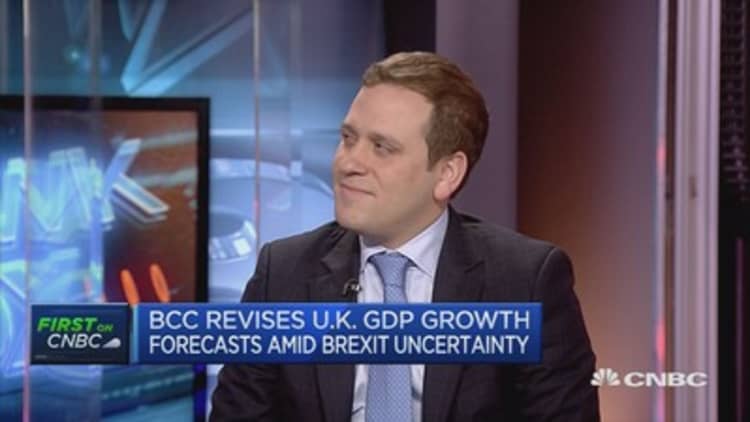
Britain's main business network has boosted its forecast for the country's economic growth this year and next but lowered it for 2018, as uncertainties surrounding the Brexit process persist.
The British Chamber of Commerce (BCC) cited higher than anticipated third quarter gross domestic product (GDP) numbers in the revision of its full-year forecast to 2.1 percent from 1.8 percent. Its 2017 forecast was simultaneously upped marginally to 1.1 percent from 1.0 percent.
However, although the BCC believes the country will manage to avoid recession, it does anticipate slowing economic momentum over the next two years given higher inflation trends and a continued lack of clarity about the process by which the U.K. leaves the EU. On the back of this, it has dropped its 2018 GDP forecast to 1.4 percent from 1.8 percent.
The BCC's Director-General, Adam Marshall, told CNBC Monday that given Brexit has not yet happened, it is, very simply, too early to tell what its impact will be.
"What we do know is that this year quite a lot of businesses are saying 'it's business as usual'. Trading conditions with the exception of the sterling depreciation are still the same … They can still trade into the same markets they could before etc," he explained.
"A lot of firms simply ploughing ahead," he added.
Reprieve for tech firms?
Yet aspects of the impending change are causing deep-seated concern to businesses across the country, says Marshall, in particular what will happen to EU nationals currently employed within the U.K.
"EU workers who are here now, working in our businesses, should be given an unconditional right to stay. That should happen now it shouldn't wait," Marshall argued.
"It would be a great gesture of goodwill for the prime minister to make ahead of negotiations but equally it's good for our businesses … This is what I hear about day in, day out," he added, noting that the U.K. government could offer this to EU workers unilaterally despite having been rebuked earlier by the trading bloc in an attempt to agree a deal on this issue ahead of full Brexit negotiations.
Apart from a reprieve for EU workers, asked what would make the picture brighter for British businesses in coming years, Marshall highlighted a moderation in inflation levels.
Speaking to the influx of investment by the world's largest technology companies into the U.K. as Facebook, Google and Apple all recently announced greatly expanded plans for London headquarters and staffing levels, Marshall said the technology sector is more able to cope with the uncertainty wrought by Brexit.
"I don't think anyone is immune from uncertainty or change but there are those businesses that really do know how to take advantage of it," he suggested.
"The ones that are really excited are the ones that see disruption as an opportunity, who see change as an opportunity. Technology companies are certainly among those," he posited.
A new Brexit challenge
The BCC's revisions come as U.K. newspaper The Sunday Times reported a fresh legal challenge would be presented to Prime Minister Theresa May on Monday, calling into question whether the government has the requisite authority to leave the single market.
The country's High Court has already ruled that May does not have the authority to trigger article 50 — the mechanism by which the two year time limit for the U.K. to leave the EU is launched — without parliamentary approval. The ruling is currently being examined by the Supreme Court.
However, the new case is allegedly set to question whether the government is able to satisfy article 127 of the European Economic Area agreement which concerns the terms under which the U.K. can leave the single market.
The claimants argue that the government lacks a mandate to exit the single market given it was not on the referendum ballot in June. Should they win in a new court case, the government would have to gain parliamentary approval to leave.
As ever, the new legal issue simply adds to the possibility of the Brexit process, and its related uncertainty, being drawn out even further – something the BCC has made crystal clear will be very unhelpful to British businesses.
"When businesses can see the road ahead they can start to invest again, they can start to make decisions with greater confidence," said Marshall.


